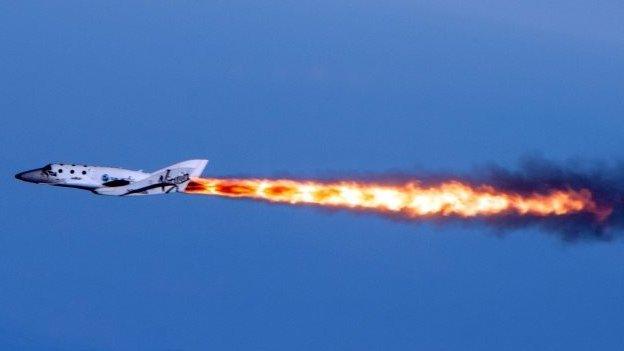Will Virgin SpaceShipTwo crash set back space tourism?
- Published

Engineers had decided to use a plastic-based solid fuel in the rocket engine
The significance of Friday's flight had been signalled for some weeks.
Virgin Galactic executives had let it be known that they were about to initiate a series of test outings that they hoped would finally lead them into commercial service after years of delay.
SpaceShipTwo had previously fired its rocket engine in flight only once in 2014, and that was way back in January.
Engineers had been grappling with a major technical decision which concerned the type of solid fuel that should be used in this engine - one that burnt either a rubber-type product, or one that burnt a polyamide-based plastic grain. Which would give right burn characteristics - the best performance?
Their preference, after experiments on the ground, was to go with the latter, and Friday's sortie marked the plastic fuel's first use in the air.
Going by eyewitness accounts, the failure suffered by SpaceShipTwo occurred shortly after the engine had been ignited.
What should have been a rapid and graceful climb skyward instead saw the vehicle break apart.
The spacecraft's co-pilot was killed in the crash
The investigation that now follows centres squarely on what happened in the engine.
It goes without saying that the crash is a tragedy for all those involved.
Nothing is more significant than the loss of life.
Everyone on the project was committed to creating a startling new venture - a new era of "affordable" space travel. Some of the best minds in the business had been attracted to work on SpaceShipTwo.
The accident is a particular blow, of course, for Virgin boss Sir Richard Branson, whose dream this was, and who has sunk a large amount of his own money into trying to make it happen.
More than 700 people have already paid or put down deposits for a trip on SpaceShipTwo
He, more than anyone, knows that everything comes down to safety in the end. You don't run a highly successful airline business for 30 years without recognising that public confidence is paramount.
Already, people are questioning the future of the project. But it is really too early for that.
Certainly, any Virgin Galactic commercial service will be further delayed.
Whether that delay is indefinite will depend in large part on the outcome of the investigation.
"Space is hard and today was a tough day," commented Virgin Galactic CEO George Whitesides in a news conference following the accident.
"We are going to be supporting the investigation as we figure out what happened. And we're going to get through it. The future in many ways rests on hard days like this, but we believe we owe it to the folks who were flying these vehicles, as well as the folks who've been working so hard on them, to understand this and move forward."
It should be said there are other ventures out there aiming to push the frontiers of commercial spaceflight, and many of them also are looking to use rocket planes.
They will no doubt pause for reflection and absorb the lessons learned, but it is doubtful they will be deterred.
Stuart Witt, the CEO and general manager of Mojave Air and Space Port, where SpaceShipTwo was based, expects this emerging "new space" sector to maintain its belief.
"I've been in this business a long time and the industry that has chosen to invest at this phase of our career, and the new generation that is joining us, is highly motivated.
"[They're] challenging and inquisitive people. And even though we have a preponderance of this new industry here in Mojave, this industry is sprinkled around the globe; it's a borderless, global industry that is interested in the commercialisation [of] - and greater access to - space.
"My message to them is stay the course. This business is worthy business."
- Published29 October 2014
- Published31 October 2014
